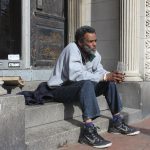
Approximately 175 people gathered at the North American Indian Center of Boston Thursday night for a panel discussion titled “Decolonizing Environmentalism,” organized by environmental organization 350 Massachusetts for a Better Future.
Rosalyn LaPier, one of the panelists, and a visiting research associate of Women’s Studies and Environmental Studies and Native American Religion at the Harvard Divinity School, wrote in an email to The Daily Free Press before the panel that Native Americans need to speak for themselves, rather than having others communicate their ideas for them when it comes to environmental protection.
“Often with an environmental justice issue non-Indigenous allies will take the lead and speak or write on behalf of Indigenous people without allowing Indigenous people to voice their own concerns,” LaPier wrote. “We have seen this with the noDAPL actions, where non-Indigenous allies are writing op-eds in the New York Times. Those same allies could be co-authoring an op-ed or better yet lifting up an Indigenous voice.”
Lisa Young, the climate justice partnerships organizer for Better Future Project, told The Daily Free Press before the panel discussion this is the organization’s first panel on the subject of colonialism and its effect on environmentalism.
“The biggest thing [local native organizations] said was for us to educate [others],” Young said. “This is an attempt to create an educational space, and [see] how these two issues intersect.”
Mahtowin Munro, a co-leader of the Native American-led organization United American Indians of New England and the moderator of the panel, said Native Americans are starting to gain the help of allies in the environmental community.
“Our struggle is far from over,” Munro said during the panel. “Our struggle is expanding. Our struggle is gaining support.”
Panelists began the discussion by recounting their tribes’ histories and explaining their involvement in the environmental activism and Native American communities.
Christian Hopkins, an indigenous activist and cultural preservationist, said during the panel that he protested at Standing Rock, and that outsiders, including Native American protesters from other tribes, need to listen to the beliefs and messages of those they are trying to help.
“It’s very dangerous when multiple objectives are demonstrated [by activists],” Hopkins said. “It pulls away from the single message to the group that you are hoping to reach, and it’s dangerous because these messages can be misinterpreted, causing a negative outcome.”
Kristen Wyman, the outreach and program coordinator at Gedakina, Inc., said during the panel that allies should work toward indigenous causes not because they want to be good people, but because they genuinely care about Native American rights.
“By simply existing, we are resisting,” Wyman said. “I am here and able to talk with you. We have to come and have these talks because we can’t ever forget.”
During a question-and-answer session following the panel, Eleanor Fort, a campaign manager for the Union of Concerned Scientists, asked panelists what ways her organization can be an ally for Native American tribes.
“I want to move us in a direction where we can work on the issues that impact indigenous communities in a way that feels just and right … and yet recognize that the lens through which we approach that work and those issues is different,” Fort said.
Several Boston residents and students who attended the panel cited opportunities for improved education on issues affecting the Native American community.
Christie Young, a senior at Northeastern University who studies international affairs, said the information discussed would help her capstone project.
“My capstone project focuses on India, and issues of religion and environmentalism,” Young said. “There are many similarities between these two [cultures]. I want to do environmentalism, and I want to incorporate social justice with it.”
Eleanor Reagan, a junior in Boston University’s College of Arts and Sciences, said many students have the privilege of not worrying about these issues, and it is important for them to learn more about vocal environmental groups.
“You have to be critical of these large organizations,” Reagan said. “You have to be critical of yourself.”
Keely Curliss, 22, of Jamaica Plain, said she is part of the Nipmuc tribe, and stressed the importance of cross-cultural education.
“With the current administration, it’s important to make sure the information is correct,” Curliss said. “[We need to] make the space to educate people on [decolonization] who … are just starting to get involved.”




You’re awesome! Thank you for your honesty and for sharing.
Wonderful information and great that Native voices are being heard in Boston!